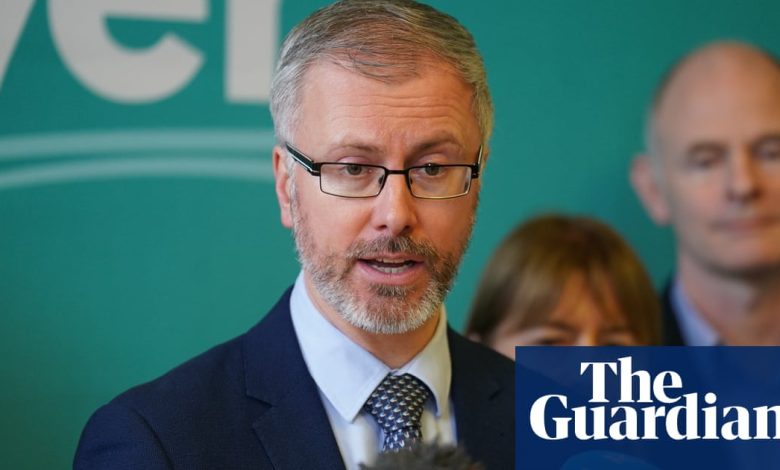Irish Greens face virtual wipeout after general election rout | Ireland

[ad_1]
The Green Party in Ireland faces virtual wipeout in the general election, with its leader admitting it is entering a period of “recovery” after the electorate removed any prospect of the party re-entering government.
The Greens look set to lose all but one of their 12 seats, that of Roderick O’Gorman, who took over as leader in July.
That would mean they would not be able to reunite with the two centre-right parties, Fianna Fáil and Fine Gael, which look set to come within a few seats of the 88-seat majority needed to form Ireland’s 34th government.
Counting from Friday’s election could continue into Monday with the proportional representation system featuring multiple counts and too-close-to-call results for final seats in many constituencies.
But late on Sunday it became clear that 10 of the Green Party candidates would be eliminated from the race. In the Dublin West constituency, O’Gorman looked as if he would slip away, making him the only Green representative in the Dáil, a humiliation for a party that won 12 seas at the last election.
Among the issues that muddied the waters for the Greens was the carbon tax on petrol, aimed at discouraging people from consuming carbon-emitting fuel, which was introduced by the previous government but blamed on the Greens. There was also controversy over Ireland’s derogation from an EU directive on nitrates, often used in fertilizers, entering rivers, with Fianna Fáil committed to keeping it while the Greens wanted to phase it out and prioritize river quality.
Ciaran Couffe, a member of the party for 40 years and a former MEP, said the Greens were the “fallen boys” and paid the price for being active.
“I think having a small party in office is at the heart of it. In the Irish political context, it is always difficult for the junior peer in government to argue for what he has achieved in government, and he seems to have responsibility for every other department, including those he does not control. It happened to Labor in 2016, it happened to us in 2011 and it looks like it’s happening to us again now,” he said.
“They saw us as Essenes. We were attacked from two sides, from some of our core supporters who felt we weren’t doing enough, and then quite loud voices in Fianna Fáil and Fine Gael who said the Greens were destroying the country, so we were caught between the hammer and the anvil,” he said.
He added: “It’s a lonely place when you’re wiped out or almost wiped out in a national election. But I think the Green issues are much bigger than an election, and having been in the Greens since the beginning for 40 years, I believe the Greens will certainly rise again and the issues are more important than ever.
As the results appeared to point to the return of some form of coalition between Fianna Fáil and Fine Gael, centre-right parties welcomed the reversal of global trends in Ireland.
Jack Chambers, deputy leader of Fianna Fáil, said: “I think in general centrist politics in Ireland has strengthened here. We have not seen the level of fragmentation in other countries, the level of polarization in politics. In fact, if you look at the far-right candidates who have stood for election, there is a clear rejection of their politics in Ireland,” he said.
He also noted that while the election had been cataclysmic for the Greens, it had strengthened two other parties on the left, with the Social Democrats expected to gain more than 10 seats and Labor on course for eight or more.
Sinn Féin, which won 19% of the vote in first place, behind Fianna Fáil’s 21.9% and Fine Gael’s 20.8%, is expected to win more than 30 seats, but not enough to lead talks to form a government .
A notable loser to emerge on Sunday was gangster figure Gerry Hutch, who lost to Labor in the Dublin Central constituency, where the four seats were held by others, including Sinn Fein leader Mary Lou McDonald.
Hutch caused chaos when he arrived at the census center in Dublin, posing for a media scrum for 15 minutes. He clashed with the RTÉ reporter but answered a BBC question asking if he would run again. “I’ve been running all my life,” he said.
Named in a court case last year as the head of a well-known crime family in Ireland, Hutch, known as “The Monk”, was released on bail in Lanzarote to run for parliament after his arrest in Spain last month as part of an international investigation into money laundering.
Hutch said in a recent podcast interview that he had a number of convictions for robbery as a younger man. He has not been convicted of any other crime recently and in a rare 2008 interview. to national broadcaster RTÉ, he denied being the leader of a criminal gang.
[ad_2]




